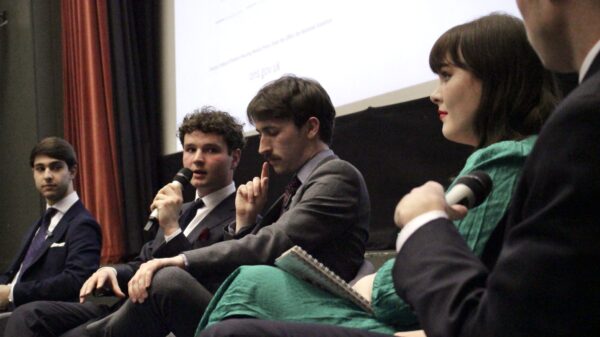Fintan Hogan, Comment editor, sits down with King’s alumni and Member of Parliament Sir Gary Streeter, as part of Roar’s alumni interview series.
King’s College London (KCL) prides itself on many of its alumni. From Nightingale to Tutu, their faces decorate windows and walls all over King’s campuses. But these are old hands in the alumni game. A new generation have graduated and are the changemakers of today. This short series of interviews aims to provide an insight into former students who have taken the short trip from Strand to SW1.
Every interviewee deserves an individual article, as each has a valuable political insight to share. After the staggered releases, we will compile one further piece which summarises the value that former students have taken from King’s in particular. Each has been kind enough to offer introspection, advice and guidance for our current students. Read carefully – these are powerful, popular and intelligent public figures who have stood in your shoes. We are grateful to each participant for their time.
Background
My final parliamentary interview of this short series was with Sir Gary Streeter – a grandee of the Tory party, and a moderate in a government recently pulled to the right. Representing South West Devon since 1997, and Plymouth Sutton for the five years prior, he has not served in Cabinet but was knighted in 2019 for his public service. He has used the backbenches to be a clear voice calling for change when he sees it as imperative, an advantage which MP Bob Seely also told me he enjoys.
He was the third MP to break rank from Johnson’s premiership in February, in what was dubbed Devon’s ‘cream tea coup’. Johnson is now long-scone, but Gary was also one of the 12 MPs to publicly call for Truss’ resignation before she too resigned.
I have today submitted a letter of no confidence in the Prime Minister and you can read my short statement about this on my website and Facebook page: https://t.co/zog9vupPrh
— Gary Streeter MP (@garystreeterSWD) February 2, 2022
On Tuesday October 24, Gary’s research assistant Mark Gilmore meets me in the lobby of Portcullis House. He admits that he got an early morning flight back from Belfast just a few hours before, but this hasn’t dented his spirit. We make small-talk and I ask for advice – this is just my fourth interview with an MP. Mark lets me know that Gary has been looking forward to our meeting, which fills me with equal measures of excitement and trepidation.
Pastures new
“Quite the month or two in politics,” I open to break the ice. “You could say global politics the last six years. Trump, Brexit, Corbyn, Boris, Truss” he tells me. As a Politics student, I’ve been told by friends and family that it’s “quite the time to be studying that” for years now, so he’s not wrong.
Mr Streeter has a long memory in politics. In Westminster for three decades now, he’s seen his fair share of political tumult. But long before entering the impossible job of politics, which must feel like herding cats, he was corralling cattle on a Devonshire farm. Like my own father, he was a first-generation university attendee from a family with a long history of agriculture. He tells me that this gave him perspective on “what’s really important” and taught him the value of hard work and diligence. His childhood was a happy one – despite constant in-fighting along the ‘food chain’ of his five brothers.
Gary publicly talks about how his religion influences his values. He attends a Methodist Church, but tells me that “denominations are very much Plan B, we should just seek to be Christians and follow Jesus.”
As part of my tribute to our great late Queen yesterday, I said:"If she was the rock on which modern Britain was founded it was because she stood on the true rock, the Rock of Ages."
Her sincere Christian faith shaped her greatness. RIP Elizabeth II— Gary Streeter MP (@garystreeterSWD) September 10, 2022
I had assumed that his upbringing had been religious, but he tells me otherwise. His wife, Jan, was the cause of his conversion later in life. “I met my wife on the fourteenth of July 1977, the day I got my first-class honours degree… I saw Jan dancing from a distance, thought she looked absolutely gorgeous. I was always fairly confident in those days, so I asked her to dance.” A year later and they were married, so Gary dutifully, if reluctantly, began attending church with his new bride.
“My initial views of Christianity were that it’s just a load of rubbish, so I started to read the Bible with a view to persuading her that it’s not true… within about three or four months I found myself intellectually converted, persuaded that what was said in the gospels was true.” His religion is now as important to his life as it is to his politics.
I promised Gary that I would include his romantic story in my write-up to win him good favour with his wife, although he reliably tells me that she would prefer a horse to another re-telling of this anecdote! Nevertheless, I hope she knows that he proudly told me that his marriage was the most important thing to him in the world. They are now 44 years married.
Conversion to politics
Gary’s rapid turnaround from sceptic to devotee was nearly as dramatic as how he came into politics. He frankly told me that he had “hated” politics for much of his early life, and had never been even tangentially involved until the age of 30. In 1985, he fell into a period of self-doubt: “Is this it then? Is this my life?” he remembers asking himself.
“Towards Christmas of that year my wife was getting fed up of me. She sent me off, said “go away and don’t come back until you’ve got this sorted.” So I went off for a day of prayer and fasting, and after about six jam doughnuts I came back and said “I believe God’s calling us into politics.” That’s the first time politics was mentioned in my house, and I was 30 years of age. I knew the name of the Prime Minister, Mrs Thatcher, because everybody hated her, I knew the name of David Owen who was a Plymouth MP and that was all. So I said to my partners in the law firm on Monday morning, “I’m getting involved in politics but I don’t know what party to join” and they all laughed.”
Only seven months later, he had been elected onto the Plymouth City Council as a Social Democratic Party (SDP) candidate. However once in office he realised that he was a “natural Tory” and crossed the floor of the chamber to join his former competition, and the party he would later represent as an MP. I hope that his legal partners give better advice about the law than they do about party politics.
Since his election as an MP in 1992, politics has changed “almost beyond recognition.” Gary’s tenure has seen typesetting become telecommunication and fax become Facetime. In his first Parliament, MPs were given pagers which beeped when someone wanted to call them. “We felt so high-tech,” he tells me, reminiscent of MP Sarah Olney telling me about her first email being sent from a KCL computer.
He describes his biggest achievement for his constituents as winning the Trident refit plant for Plymouth, snatched away from Gordon Brown’s Rosyth constituency. This won “many millions of pounds and thousands of jobs” for his local area. His day-to-day work is also a source of pride, saying that he is “very pleased to help people.” This includes work for religious institutions and the Westminster Foundation for Democracy. “A member of Parliament has the power to convene, and that’s the greatest power we have.”
36 years later and he is considering retirement. He says that it is “an open discussion that my wife and I are having” but jokes that “in the end I’ll just do what she tells me.” Devoting around four decades of his life to public service, he feels that he has satisfied his Christian duty.
I ask about any tension between faith and politics which he may have experienced, and if his beliefs had ever been challenged by his work. “My faith has always been a guiding light to me; [but] there’s been many times when I wanted to pack in politics” he half-jests. “No plan survives first contact with the enemy” he advises, but he’s managed to “find a balance between ridiculous optimism and rank pessimism. Any idealism that you come into this place with tends to get dented, but hopefully not smashed to pieces.”
Saving Conservatism?
In passing, Gary mentioned to me that in 1997 the Conservatives got “absolutely hammered, and rightly so, in the polls.” “Rightly so?” I ask. I’m naturally a cynic about parliamentary politics – do MPs really admit that their party shouldn’t be elected? “Does the Conservative Party deserve a similar result at the next election?” I expect a flat no – ‘lessons have been learned’, ‘we need to move on’, ad infinitum.
“Well I think in any mature democracy you have to have a change of party in government after 10, 12, 14 years, so we’re approaching that period. I think it would be quite remarkable if we were to win again, and if we are to win again then Rishi Sunak is going to have to become an almost god-like creature. Otherwise, if we become a one-party state, that’s not a democracy. So of course there will come a day when we are asked by our constituents to step back and Labour to step forward, more likely than not at the next election that will happen.”
For someone so devout, I’m surprised to hear him use the adjective “godlike”. I ask if Sunak can be this “superhuman” figure. “Yes, I think he’s very special,” he says, his voice laden with respect. “There’s been three people here that I’ve really believed in, in my time.” These, it turns out, are William Hague, David Cameron and now Rishi Sunak.
“As soon as I met the guy and was sat in various meetings with him, I was thinking “wow.” He’s just super smart, he’s the smartest guy in the room. He is decent, he’s got great values, he’s incredibly hard working, he’s got a vision. So, what’s not to like?”
Best leaders speech at the 1922 committee I have heard in 30 years at Westminster
We made the right choice.— Gary Streeter MP (@garystreeterSWD) October 24, 2022
I was aware that Gary had managed to artfully avoid the question of if the Conservatives deserved to lose the confidence of the electorate, so I change tack. I ask about his party’s recent record. Everything Sunak had predicted about Truss’ catastrophic economic policies had come true – what had his reaction been at the time? His answer is worth noting in full.
“I watched it… with growing incredulity. I just couldn’t believe what I was hearing, because to me it was like Sixth Form politics, which I was never involved in by the way. Maybe you have these brilliant academic ideas, but hang on a minute, this is the real world – excuse me this is the real world. So in the midst of global inflation, in which the Bank of England is desperately trying to increase interest rates to reduce demand, at the same time we are cutting taxes to increase demand. Well how does that work? It was just nonsense. I felt the whole thing was ridiculous and I was very angry about it.”
I told him that this was more or less what Lib Dem Sarah Olney had told me. “There you go” he replied – be under no illusions as to how Truss was seen even by those within her own party. But he predicts that the vast majority of Tory MPs will now get behind Rishi. “He said to us yesterday that we’ve got to unite or die, and we’ve got to unite.”
Sadly, it seems we must change leader BUT even if the angel Gabriel now takes over, the Parliamentary Party has to urgently rediscover discipline, mutual respect and teamwork if we are to (i) govern the UK well and (ii) avoid slaughter at the next election.#lastchance
— Gary Streeter MP (@garystreeterSWD) October 20, 2022
None of this confers a particularly strong sales pitch to the electorate. He is very clear-eyed about how his party is seen by the public – he references their disastrous polling and calls the past few months a “shambles”. He does, however, believe that Labour leader Keir Starmer will not be as potent an “antidote” to Sunak as he was to Johnson.
The Johnson legacy
I ask specifically about the Rwanda refugee plan, thinking that this may come into conflict with his Christian morality. He said that something had to be done to tackle the channel-crossing issue and that processing applications in a third-party country (such as Rwanda) wasn’t necessarily wrong, but that “it just sort of sticks in the throat.” This is a difficult situation, he recognises, but he hopes that “we can find a better way to solve the problem than sending people on an aeroplane to Rwanda, and it isn’t my dream to see an aeroplane taking off full of vulnerable [adults] and children going to an African country.”
Then I pivot to what was, for me, the most incredible part of the interview. Boris Johnson is a polarising figure and Mr Streeter had been one of the leading voices speaking out against his potential re-election as leader of the Conservative party after Truss’ deposition.
David Frost nails it: we cannot go back to Boris https://t.co/NNLbyaxHL0
— Gary Streeter MP (@garystreeterSWD) October 22, 2022
What would ‘Boris 2.0’ have meant for the Conservatives?
“Some of us became very anxious that this might become a reality and I had two sleepless nights thinking ‘well if he does come back as our leader, what will I do then?’ because I certainly couldn’t serve under him. I thought it would probably split the party and be a disaster for our country, so it was a very serious moment – fortunately it’s passed. I can’t believe that 102 of my colleagues thought it was a good idea for him to come back, certainly when we’ve still got an inquiry into whether or not he misled Parliament. It was the worst idea ever and 102 of my colleagues seemed to think it was a good idea.”
It’s worth remembering that Gary was one of the first to announce that he had submitted a letter of no confidence in the Prime Minister back in February, but nonetheless this is an extraordinary assessment of a colleague. I ask if he would have resigned the whip (left the Parliamentary Conservative party) if Johnson had been re-appointed. “It’s one of the things that I was grappling with at three o’clock in the morning,” he confesses.
“I think his day has come and gone. When he was first elected as leader, I said… that he was a deeply flawed human being but capable of greatness. We’re all flawed, his flaws are perhaps deeper than some, but actually very few people are capable of greatness and he is. I stand by that; I think that’s a fairly good description of him. For me, the flaws outweigh the greatness, in the way that ivy chokes a beautiful oak tree – the flaws were just too great to lead a country like our own, and I couldn’t ever see him leading our party again.”
Had he been restored to Number 10, Gary tells me that “there would have been an absolute meltdown disaster here [in Westminster] and in the country.” I point out that both Truss and Johnson won with the members, and Johnson (had he run) almost certainly would have done again. He clearly believes these to be unsuitable leaders. What gives members – who pay a nominal fee – the right to appoint a party leader contrary to the wishes of elected Members of Parliament?
He states that a review of the rules is necessary, since “it just doesn’t work” to have a leader “imposed” upon MPs who do not wish to serve under them. He tells me that most of his colleagues “knew, lovely person though [Liz Truss] is, [that she] wasn’t up to the job. I’m not up to the job, most of us here aren’t up to the job – you’ve got to be a very special person to lead a country like this.” He is sceptical that members get to dictate political leadership when they have little interaction with the politicians in question – particularly when the party leader will be the Prime Minister too.
Alex Burghart and Bob Seely had both told me that there was little chance of Conservative MPs voting for an early general election. “Any chance of turkeys voting for Christmas?” I ask wryly. He chuckles and agrees with his colleagues, saying that the markets need stability and that they still have a large majority in the Commons. He predicts an election will be called no earlier than 2024.
But he doesn’t necessarily seem to think that losing a general election would be bad for the Conservatives. He is clearly discontented with many of the decisions that his party has made over the last few years, and believes that time in opposition would allow the time to “come up with something better. I say this to colleagues: ‘in a democracy guys, we’ve got to have a change of party in government… we need to go into opposition again at some stage and find out who we are, what do we really believe?’”
They may not have to wait long to find out.
Roar thanks MP Sir Gary Streeter, parliamentary research assistant Mark Gilmore and constituency office manager Sally Dean for their time.



















